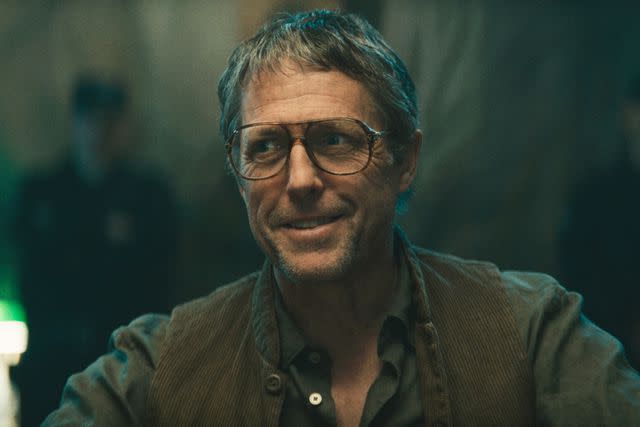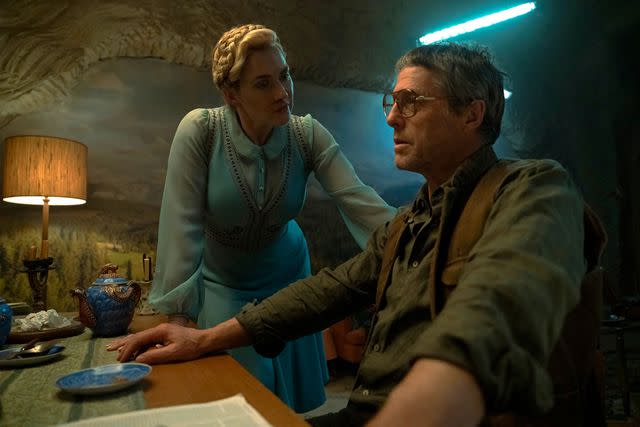“The Regime”'s“ ”Hugh Grant says going into politics has 'crossed my mind'
- Oops!Something went wrong.Please try again later.
- Oops!Something went wrong.Please try again later.
"What I really see close up is that it's almost impossible to actually get anything done," the actor tells EW of the political sphere.
Warning: This article contains spoilers about The Regime episode 4, "Midnight Feast."
Hugh Grant has added another politician to his CV.
From playing the prime minister in Love Actually to the corrupt Jeremy Thorpe in A Very English Scandal, the English actor has his fair share of politicians to his credit. Now, he's added another one with Edward Keplinger, the former chancellor ousted by Kate Winslet's Elena Vernham on HBO's The Regime.
Keplinger, known for his far more progressive policies, has supposedly been living out his days in luxury in the country. But on Sunday's episode, Zubak (Matthias Schoenaerts) discovers that Keplinger has actually been imprisoned by Elena's regime this entire time.
At Elena's direction, Keplinger endures regular beatings, but when Zubak is thrown in prison with him, he sees a chance to regain power. Until Zubak grows disillusioned with him and realizes that he's just as much a user as Elena.
We caught up with Grant, who has become increasingly politically active over the last two decades, to talk about Keplinger's real aims, what would've happened if he'd successfully regained power, and whether or not Grant would ever go into politics himself.

Miya Mizuno/HBO
Hugh Grant on 'The Regime'ENTERTAINMENT WEEKLY: You partnered with Stephen Frears on this project. This is your third time working together. What makes it such a great working relationship?
HUGH GRANT: He was kind enough to decide in 2015 that I was a better actor than I thought I was. He cast me in Florence Foster Jenkins with Meryl Streep. Just as I was really saying goodbye to show business, he hauled me back and that worked out well. I loved him as a person, and I found that I really shared his taste in scripts, and I liked the way he made films. I liked his style. So, we did that and we did A Very English Scandal. The third thing he sent me was this, and yet again, I felt, "Well, great taste, Stephen. Good writing." So it was easy.
You've been very outspoken about political corruption, so was that something that appealed to you about this role?
I don't think that was it, really. Although it may have been behind Stephen's thinking in asking me to play it. I was really not interested in politics at all until I was about 50. I sneered at politics, and then, I found myself campaigning about the abuse of power in the British tabloid press here in the U.K. I spent an awful lot of time in the House of Parliament lobbying politicians and got to know them up close and see what weird specimens they were or became in the course of their careers. Very often starting with conviction and passion and ending up a couple of decades later, these slightly monstrous professionals of the political game of snakes and ladders. Their priorities were 1.) their own career, 2.) their own party and smashing the other party, and somewhere, way down the list, was what's good for the country.
So, I am quite interested in politics from that point of view. Keplinger certainly is an interesting specimen because it was always hard to decide if he really cared about the people or whether it was a bit of a pose and he was more interested in revenge on Elena, who toppled him, and whether he was, like so many politicians, something of a narcissist who just wanted to be up there as the great leader.
Do you think Keplinger was ever actually very benevolent or progressive? Or he's just as bad as Elena in a different way?
He would've asked himself this question often in his darker moments. I suspect that he certainly convinced himself that he really believed in social justice and socialism when he was a student and a hot prof back at whatever university he was at, where he taught and where he attracted large crowds of young people (particularly female students). They liked his "dissident cool." He probably did believe that he believed this stuff, but by the time this thing starts, what he's consumed with is loathing of Elena. She toppled him, she ruined his career. And of course on top of that, she's got his family and he's powerless to do anything about it.
Did you talk with Stephen or creator Will Tracy at all about how he was toppled? He seems almost too smart for that.
Yes, and my question was, "Was it a fair and square election in which Elena was just legitimately elected on a great upsurge of populist opinion as with Brexit or Trump, or was there skullduggery?" Will said that there was a bit of skullduggery and that the USA had helped her come to power. But even so, I think he would be troubled by the idea that actually, even if it had been fair and square, she might've won because she has the common touch in the way that Boris Johnson had, for some reason, a common touch. Keplinger didn't have the common touch and might be seen as rather intellectual and privileged and aloof and out of touch.

Miya Mizuno/HBO
Kate Winslet and Hugh Grant on 'The Regime'We see him try to convince Zubak to come over to his side and help him take back power. If he had been successful, what do you think would've happened?
I can't remember what the people are thinking of Zubak at that stage. He was still quite popular by the time she decides to imprison him. He's quite popular with the people, so maybe there would've been a chance. But I have this feeling that the people would never really have taken Keplinger to their hearts again. He might've had a chance with Zubak, but then there would've been, presumably, a power struggle between the two of them. I think Zubak would've ended up murdering him; Keplinger would've died in a mysterious air accident.
Keplinger's book is called Radical Democracy and its Dialectics, which is such an absurd title. Did you have some loose notion in mind of what the book was about?
I did. It was an academic tome that was quite difficult to plow through. He was a typical case of someone who was pretty much a Marxist when he was teaching in university. Gradually, all that has been watered down. You see in that penultimate scene with Zubak. There's a slight hesitation when the Zubak says, "And we will get rid of the Americans." And he goes, "Yeah, yeah, we will." But he's watering everything down. He's become a pragmatist and actually has come to roll his eyes, or worse, to despair or even loathe the idealists. Because the idealists get nothing done.
What do you find scarier, someone blatantly out of their depth like Elena or someone more cunning like Edward?
Although Keplinger may well have his faults, I don't think he's a murderer. I don't think he's corruptible that way. So, she's infinitely more dangerous.
You've played a few politicians in your time. Would you ever want to go into politics yourself?
It has crossed my mind. But what I really see close up is that it's almost impossible to actually get anything done. It's just impossible. You've got to bring so many people with you. My wife's mother is a politician. She was quite senior in the Swedish Parliament. Whenever the subject comes up, she just says, "Don't. You have to water down everything. It's all horse trading. And nowadays the incoming abuse is unthinkable." In 2019, the last general election here in the U.K., I did mount a tiny campaign to try and persuade people to vote tactically because in our electoral system, this was the way to prevent Boris and company getting back into power. I campaigned in a few marginal constituencies for whoever was the closest rival to the conservative candidate. Actually, I did very badly. We lost in every single constituency.
What was interesting was the abuse that came in from the right. I never know if they're real or if they're bots. But they're good. They're brilliant at what they do. And it was absolutely terrifying. I've had a bit of it before during the Hacked Off campaign, but this was really extreme and shocking and threatening to one's family. So, I do see that you have to be either very brave or insane to go into politics in the digital age.
This interview has been edited for length and clarity.
Sign up for Entertainment Weekly's free daily newsletter to get breaking TV news, exclusive first looks, recaps, reviews, interviews with your favorite stars, and more.
Related content:
The Regime creator calls it 'a fairytale' within the trappings of a satire of autocracy
The Regime review: Kate Winslet's dictatorship dramedy falls flat
Hugh Grant will never forget the hot dogs he ate on Two Weeks Notice set: They 'blew my a-- out'
Read the original article on Entertainment Weekly.

